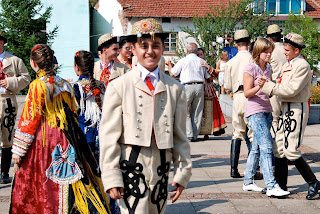Bulgarians celebrated Dimtrovden on October 26th. Dimitrovden, besides being a big nameday holiday for anyone named Dimitar or Dimitrina (the third most common Bulgarian name) is also celebrated as the holiday that marks the start of winter. St. Dimitar, legend has it, rides a red horse and brings frost alongside, snow falling from his white beard. St. Dimitar is also the patron saint of builders and carpenters. Houses and construction projects should be finished by this date and the fieldwork brought to an end. A traditional gift for a Dimitar or Dimitrina are white flowers bound by a red thread—the white flowers symbolize a mellow winter, the red thread the health of the recipient in the coming year. If there is a full moon on Dimitrovden, it is believed, the winter will be mild, spring will come early, and the bees will fill the beehives. Graves are cleaned and fresh bread is brought to the graveyard.
St. Dimitar was born to a Christian family in Saloniki in the late 200s. His family’s beliefs, however, were not public and upon inheriting wealth from his parents, he was made a town chief by Emperor Diocletian. As town chief, Dimitar was supposed to persecute Christians. He did not do this and was caught preaching to townspeople. He was thrown in to prison, tortured, and, on 26 October 306, killed. His remains were transferred to a small church and are believed to be responsible for curing ill people and saving Saloniki from conquest.
St. George and St. Dimitar are popularly portrayed in folklore as twins or brothers. Georgovden (St. George’s Day) in May marks the start of summer, Dimitrovden the start of winter. Below is a popular legend about them I found on http://bnr.bg/sites/en/Lifestyle/Folklore/Pages/2610Dimitrovden.aspx
There was once a poor man who used to go finishing every day. Once he caught a small fish. It spoke to him with a human voice and begged him to let it go. The man was merciful and went back home that day with nothing to eat. Some time later, he caught the same fish but it was now bigger. He let it go again. The same thing happened a third time. The man decided to release the fish again but the it spoke to him: “Poor man, don’t let me go this time. Take me back to your house and cook a meal for you and your wife. Then, bury the bones under the mangers of your mare”.
There was once a poor man who used to go finishing every day. Once he caught a small fish. It spoke to him with a human voice and begged him to let it go. The man was merciful and went back home that day with nothing to eat. Some time later, he caught the same fish but it was now bigger. He let it go again. The same thing happened a third time. The man decided to release the fish again but the it spoke to him: “Poor man, don’t let me go this time. Take me back to your house and cook a meal for you and your wife. Then, bury the bones under the mangers of your mare”.
The poor man was feeling sad for the fish but obeyed its words. Soon, his wife gave birth to two boys, and the mare to two foals. One boy was named Dimitar, and the other George. The boys grew and became strong and handsome lads. One day, they saddled their horses and set off to travel around the world. They reached a crossroads. Georgi took the left road and Dimitar - the right. Some time passed and Dimitar received a sign that his brother was in danger. He headed to look for him but all he could find was his horse – Georgi had been eaten by dragons. Dimitar managed to make the dragons return the soul of his brother. The twins mounted their horses and became saints. Thus they soared to heaven and started helping ordinary people on earth.
















































